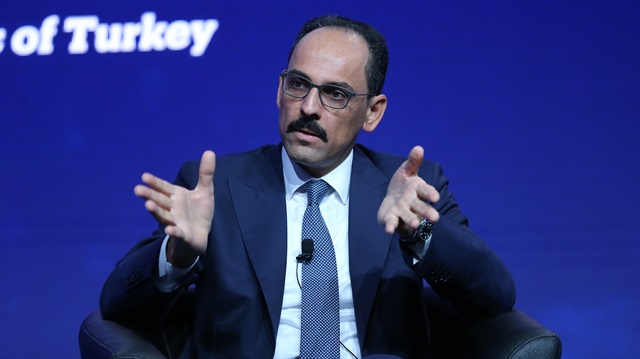
Turkish presidential spokesman addresses TRT World Forum.
Presidential spokesman Ibrahim Kalın blamed on Thursday increasing "unilateralism" and "racism" for the insecurity and crises across the world.
"The world feels insecure in the face of increasing unilateralism and racism and when one world leader tells another that they can't survive even for two weeks without his help," Kalın told a session of the TRT World Forum in Istanbul themed "Regional Players and the Shifting Security Equation in the Middle East".
On Wednesday, U.S. President Donald Trump warned that Saudi Arabia would be unlikely to last a fortnight without military assistance from Washington.
"The problem of security is a global problem. It is not just about Muslim countries. It is not just about Muslim nations or the Middle East. I feel very insecure when I see the rising Islamophobia in Europe," he said.
"In fact, it is generated by the failures of the regional countries, no doubt, and regional actors, but it is also exacerbated by the global powers."
"Every time we think of the Middle East, we think of conflict and war, but this was not the story of the region until a century ago. Yet only a few centuries ago, many countries that make up the Middle East today were home to many luminaries," he noted.
Over a deal between Turkey and Russia to save civilians in Syria's Idlib from a military offensive by the Assad regime, Kalın said, "the agreement is certainly the best news we have."
"The deal is there thanks to tireless efforts by our President Recep Tayyip Erdogan who made it happen.”
Noting Turkey cannot carry this burden on its own, Kalın said: "You see these shifting policies of key players in Syria from the United States to […] Gulf countries and others. And that creates not only a lot of confusion but also a loss of trust on the ground.”
The presidential spokesman noted that the U.S. said the country was in Syria to eliminate Daesh but "as they said Daesh [is] largely defeated."
Following a meeting in Sochi, Russia, last month between Turkish President Recep Tayyip Erdogan and his Russian counterpart Vladimir Putin, the two countries agreed to establish a demilitarized zone in Idlib, Syria’s last opposition stronghold.
Ankara and Moscow also signed a memorandum of understanding calling for the “stabilization” of Idlib's de-escalation zone, in which acts of aggression are expressly prohibited.
Under the deal, opposition groups in Idlib will remain in areas in which they are already present, while Russia and Turkey will conduct joint patrols in the area with a view to preventing renewed fighting.
Syria has only just begun to emerge from a devastating conflict that began in 2011 when the Assad regime cracked down on demonstrators with unexpected ferocity.








